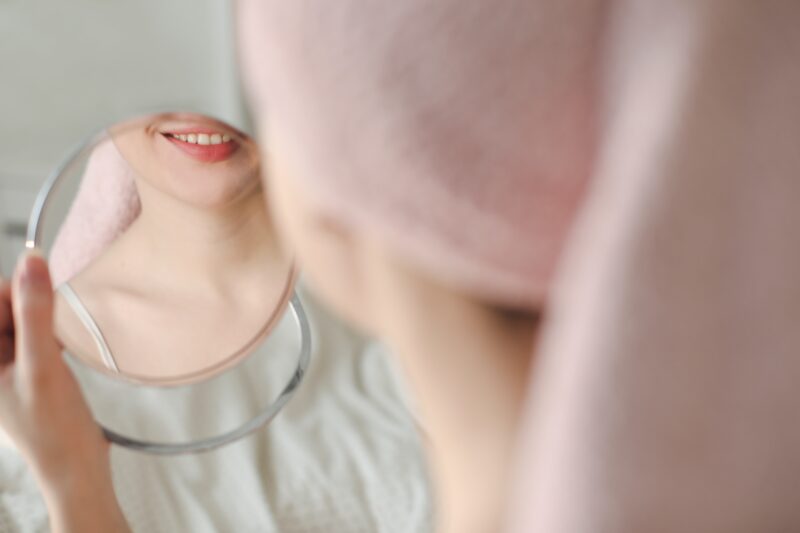Mouthwash, in its essence, is like a trusty sidekick in your oral health adventure – it complements your brushing and flossing routine, adding an extra layer of cleanliness and protection. We know that mouthwash is good for you, but it’s only effective if you know how to use mouthwash correctly.
Using mouthwash correctly comes down to timing, quantity, and technique. Here’s a guide to ensure that when you swish, it’s done with precision and purpose, for optimal results.
Step-by-Step Guide on How to Use Mouthwash
Using mouthwash effectively is more than just a splash-and-swish routine. There’s a proper method to ensure you’re reaping all its benefits. Here’s how to maximise the efficacy of your mouthwash routine.
- Brush and Floss First: Always start with a clean slate. Brushing and flossing remove the bulk of plaque and food particles, allowing the mouthwash to target the residual bacteria and debris.
- Measure the Right Amount: Check the label for the recommended amount – usually, it’s about 20ml. Pouring too much or too little can dilute its effectiveness.
- Swish with Gusto: Empty the liquid into your mouth and swish vigorously. Be sure to move it around your entire mouth, including hard-to-reach areas. The goal is to cover every nook and cranny.
- Timing is Key: Aim for a solid 30 seconds to a minute of swishing. Use a timer if needed. This duration ensures the mouthwash has enough time to work its magic.
- Gargle for Good Measure: To ensure you’re reaching the back of your mouth and throat, finish with a brief gargle. This step is particularly beneficial for mouthwashes designed to tackle bad breath.
- Spit, Don’t Swallow: After you’ve swished and gargled, spit the mouthwash out. Mouthwash is not meant to be ingested.
- Post-Rinse Protocol: Avoid eating or drinking anything for at least 30 minutes after using mouthwash. This gives the active ingredients time to do their job effectively.
Remember, while mouthwash is a fantastic supplemental tool, it’s not a standalone solution. It works best in concert with brushing, flossing, and regular dental check-ups. Think of it as part of a wider team effort in maintaining your oral health.
The Common Mistakes to Avoid When Using Mouthwash
While mouthwash is a fantastic addition to your oral hygiene toolkit, a few common missteps can reduce its effectiveness. Avoid these common mistakes when using mouthwash.
- Using Mouthwash Right After Brushing: If you brush with fluoride toothpaste, wait a bit before using mouthwash. Some mouthwashes can wash away the concentrated fluoride in the toothpaste, diluting its benefits.
- Diluting the Mouthwash: It might be tempting to dilute mouthwash with water, especially if the flavour is strong. However, this can significantly decrease its effectiveness. Stick to the recommended concentration.
- Eating or Drinking Immediately After: As mentioned, mouthwash needs time to work its magic. Eating or drinking too soon after rinsing can negate the benefits.
- Overusing Mouthwash: Yes, you can have too much of a good thing. Overusing mouthwash, especially those with certain active ingredients, can lead to oral dryness, irritation, and other issues.
- Ignoring the Instructions: Each mouthwash comes with its own set of instructions and recommended usage. Make sure to read and follow these to get the maximum benefit.
- Expecting Mouthwash to Fix Everything: Mouthwash is an adjunct, not a cure-all. It’s most effective when used in conjunction with regular brushing, flossing, and dental check-ups.
By avoiding these common mistakes, you can ensure that your mouthwash routine is as effective as possible.
Can You Overuse Mouthwash?
Mouthwash can be a double-edged sword – beneficial when used properly but potentially harmful if overindulged.
The term ‘overuse’ can refer to both the frequency of mouthwash use and the duration of each rinsing session. Exceeding recommended guidelines on either front can lead to trouble.
Using mouthwash too often or for too long can cause:
- Oral Flora Disruption: Our mouths are ecosystems where beneficial bacteria reside. Overusing mouthwash can disrupt this delicate balance, potentially leading to an overgrowth of less desirable organisms.
- Tissue Irritation: The alcohol and other chemicals in some mouthwashes can irritate the mucous membranes, leading to discomfort and sometimes ulcers.
- Dental Health Complications: There is a possibility that excessive use of mouthwash could mask symptoms of underlying dental issues that require professional attention.
If you find yourself reaching for your bottle of mouthwash more than necessary, ask yourself why. Do you experience persistent bad breath? Are you concerned about plaque? These issues are often better addressed with direct dental interventions and improved brushing and flossing techniques.
If you’re unsure about your mouthwash habits or if you’ve experienced any adverse effects, speak to your dentist for expert guidance.
Mouthwash Advice From Dentistry on Coolum
From its bacteria-battling prowess to its breath-freshening benefits, mouthwash certainly earns its place in our bathroom cabinets. But, as with any hero of hygiene, it comes with its own set of guidelines and limitations.
If you have questions about incorporating mouthwash into your oral care routine, or if you’re looking for personalised advice on the best products for your unique dental needs, we’re here to help. Schedule an appointment with us at Dentistry on Coolum, and let’s work together to keep your smile shining bright.


